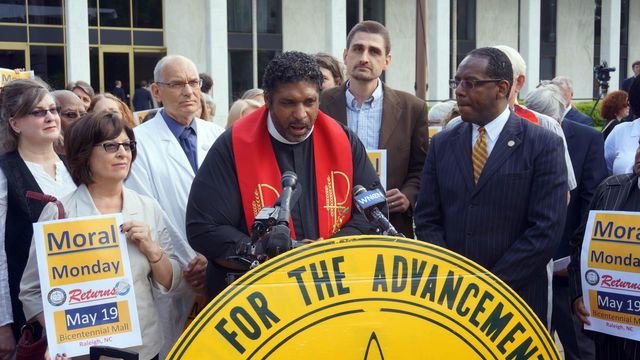'Moral Monday' protests returning to legislature next week
Leaders of a protest movement that led to nearly 1,000 arrests at the General Assembly last year announced Wednesday that they will hold their first rally of the 2014 legislative session next Monday.
Posted — UpdatedLed by the NAACP, the "Moral Monday" movement tapped an undercurrent of dissatisfaction with the Republican-led General Assembly. Riffing on Gov. Pat McCrory's theme of a "Carolina comeback" to describe his economic policies, state NAACP president Rev. William Barber said during a Wednesday news conference that the priorities of McCrory and the Republican legislative leadership continue to produce a "Carolina setback" and need to be changed.
"Our goal is to engage public policy with a moral narrative that puts a face on the policies," Barber said. "The myth of extremism is that they can hurt a small subset of people without hurting all of us.”
Although the causes for which protesters turned out last year varied, voting rights and the state's refusal to expand its Medicaid health insurance program for the poor were top of mind for many.
Legislative cuts to education spending and low teacher pay were also at the top of the list. North Carolina Association of Educators President Rodney Ellis called it "a turning point" for the state.
"Public education is the gateway to full participation in this democratic society," Ellis told the crowd. "Public education is a social justice issue. Treating teachers and all school employees fairly is a social justice issue. The right to a sound basic education is not only a constitutional right, it is a moral right. And protecting those rights for our students in North Carolina is a social justice issue."
Last year's weekly protests followed a pattern in which hundreds, and sometimes thousands, of protesters would gather on the grassy mall behind the legislative building late on Monday afternoons. Then, as lawmakers convened their Monday evening sessions, some of those protesters would move into the building. Some would sit outside the massive chamber doors on the second floor of the building and hold forth on their grievances. Sometimes there would be songs, other times speeches.
General Assembly police, with help from the Raleigh Police Department, would then arrest those protesters who refused to leave.
Since the end of the 2013 General Assembly session, some protesters have been convicted of minor charges, while others have seen their cases dismissed for a variety of reasons.
Barber likened the movement to the Civil Rights movement across the South in the 1960s.
"People said when they started, they were foolish. They would never be able to change the dynamics of Birmingham, (Ala.)," he said. "Don’t try to understand the movement winning and losing by what happens in the immediate. Understand this is a prolonged campaign."
Related Topics
• Credits
Copyright 2024 by Capitol Broadcasting Company. All rights reserved. This material may not be published, broadcast, rewritten or redistributed.






